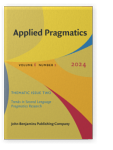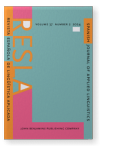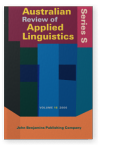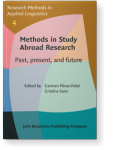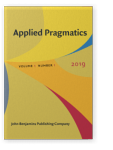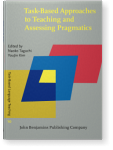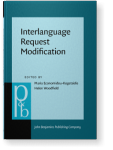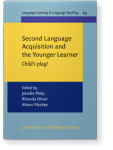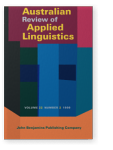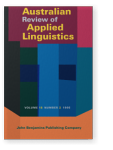Eva Alcón-Soler
List of John Benjamins publications for which Eva Alcón-Soler plays a role.
Journals
Title
Discourse Analysis and Language Teaching
Edited by Eva Alcón-Soler and Josep R. Guzman Pitarch
[Australian Review of Applied Linguistics. Series S, 16] 2000. iv, 156 pp.
Subjects Applied linguistics | Language acquisition | Language teaching
2023 Chapter 11. Investigating pragmatic development in study abroad contexts Methods in Study Abroad Research: Past, present, and future, Pérez-Vidal, Carmen and Cristina Sanz (eds.), pp. 265–289 | Chapter
A study abroad (SA) period is considered an optimum environment for developing pragmatic competence because of the unparalleled target-language access it provides. Within this context, pragmatic development has received extensive attention over the last two decades, during which we have seen an… read more
2019 Pragmatic outcomes in the English-medium instruction context: The influence of intensity of instruction Applied Pragmatics 1:1, pp. 68–91 | Article
This study investigates pragmatic development in the English-medium instruction (EMI) setting of the Valencian Community in Spain. More specifically, the study examines whether the intensity of EMI influences functional adequacy (FA) in second language (L2) writing. Participants were 102 EMI… read more
2018 Chapter 3. Effects of task supported language teaching on learners’ use and knowledge of email request mitigators Task-Based Approaches to Teaching and Assessing Pragmatics, Taguchi, Naoko and YouJin Kim (eds.), pp. 55–81 | Chapter
The present study examines whether task supported language teaching (TSLT) has an impact on L2 English learners’ use and knowledge of request mitigators, assessing the impact of student-students vs. teacher-students interactions on students’ attention to pragmatics during task-based interaction.… read more
2012 Teachability of request act peripheral modification devices in third language learning contexts Interlanguage Request Modification, Economidou-Kogetsidis, Maria and Helen Woodfield (eds.), pp. 275–314 | Article
Research on interlanguage pragmatics dealing with request modifiers in EFL contexts has largely ignored the multilingual context in which this language is learnt. Previous studies comparing the use of request modifiers by monolingual and bilingual learners of English point to differences in the… read more
2008 Incidental focus on form and learning outcomes with young foreign language classroom learners Second Language Acquisition and the Younger Learner: Child's play?, Philp, Jenefer, Rhonda Oliver and Alison Mackey (eds.), pp. 173–192 | Article
This chapter addresses the issue of how unplanned focus on formis accomplished in an English as a foreign language (EFL) classroom and its effect on adolescents’ learning outcomes. The findings support previous research indicating that adolescents benefit from interaction in foreign language… read more
2000 The role of conversational interaction in the development of a second language: Its application to Englih language teaching in the classroom Discourse Analysis and Language Teaching, Alcón-Soler, Eva and Josep R. Guzman Pitarch (eds.), pp. 135–154 | Article
2000 Discourse analysis and language teaching: An introduction Discourse Analysis and Language Teaching, Alcón-Soler, Eva and Josep R. Guzman Pitarch (eds.), pp. 1–8 | Article
1999 The use of ‘well’ in spoken interaction: An example of what language teachers and learners can get from analysing spoken discourse Australian Review of Applied Linguistics 22:2, pp. 119–133 | Article
In this study the use of "well" as a discourse marker is analysed in sixteen episodes of a television series and in two English language textbooks to illustrate what communicative language teaching can get from work on discourse analysis. Results of the analysis show that the meaning of well as a… read more
1995 The relationship between content knowledge and practise opportunities in non-native learners’ interaction Australian Review of Applied Linguistics 18:2, pp. 19–32 | Article
The following study was undertaken to further understand the effect of content knowledge on learners’ participation in interactions between non-native speakers. 120 male students, all of them Spanish, were paired to form 20 dyads whose members had equal content knowledge, but different levels in… read more
